
Coronavirus has spread from Wuhan in China to countries across the world, with tens of thousands of confirmed cases and thousands of deaths worldwide.
Here is all you need to know today.
– What is the scale of the problem?
So far, China has reported nearly 80,000 cases and almost 3,000 deaths.
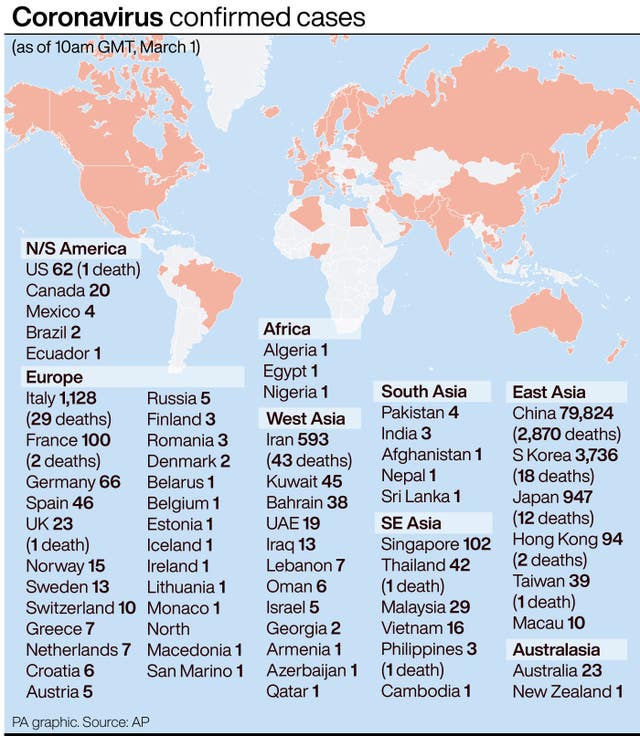
Outside China, there have been cases in nearly 60 countries with around 100 deaths.
The first Briton to die from the virus had been on board the Diamond Princess cruise ship which was quarantined off the coast of Japan.
He was the sixth passenger from the ship to die after more than 700 tourists contracted coronavirus on board.
– What’s happening in the UK?
There have been 36 confirmed cases in the UK, with more than 10,000 people having been tested.
There have been 33 cases diagnosed in England, one in Northern Ireland and one in Wales.
On Sunday, Scotland reported its first case – a Tayside resident who recently travelled from Italy.
The 20th case was the first transmission of coronavirus within the UK and the Department of Health and Social Care said the original source was “unclear”.
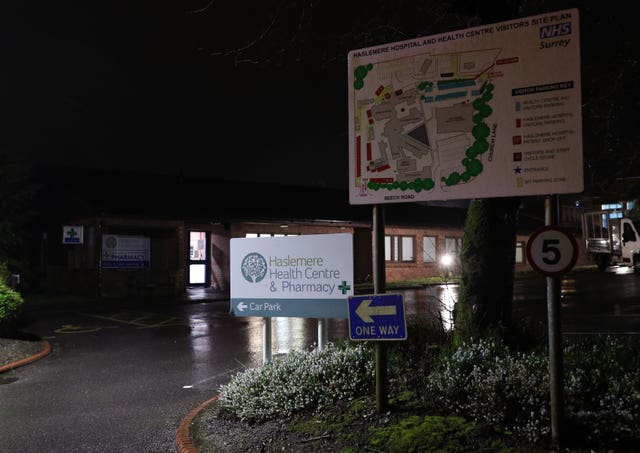
Eight of the confirmed UK cases have been discharged from hospital. There have been no deaths.
The first diagnosed case in the Irish Republic was reported on Saturday.
– What is the UK Government recommending people returning from infected regions do?
The UK Government said people returning from Hubei province in China, Iran, lockdown areas in northern Italy and special care zones in South Korea in the last 14 days should immediately self-isolate at home and call NHS 111.
People returning from a number of other countries including the rest of China and Korea, Japan, Hong Kong and Singapore should self-isolate if they develop symptoms of cough or fever or shortness of breath.
It also said those returning from Vietnam, Cambodia, Laos, Burma and northern Italy above Pisa should self-isolate if they show symptoms.
– What about schools?

Although several schools have sent pupils home over fears of Covid-19 contact, Public Health England’s general advice is for them not to close.
Burbage Primary School in Buxton, Derbyshire, was closed on Thursday because of a case diagnosed in a parent.
Willow Bank Infant School in Berkshire informed parents on Saturday that it would be closing for “some days” after a staff member tested positive for the virus.
– What will happen if it is declared a pandemic?
Health leaders have said if coronavirus becomes a global pandemic then there are a number of contingency plans in place to halt its spread.
In the UK, Health Secretary Matt Hancock has said the Government has a battle plan for tackling coronavirus should a pandemic be declared.
The UK is a world leader in preparing for and managing diseases like #coronavirus.
Today, @MattHancock sets out an enhanced government approach to pandemic preparation.
Here's an outline of the measures we're putting in place 🔽 pic.twitter.com/h6DrySmr95
— Department of Health and Social Care (@DHSCgovuk) March 1, 2020
It is understood new emergency powers will be brought in to give schools, councils and other parts of the public sector powers to suspend laws – including health and safety measures – to cope with a pandemic.
A “war room” is to be set up in the Cabinet Office to ensure effective co-ordination of public information.
Mr Hancock has said the long-term strategy for ensuring Covid-19 is contained is attempting to delay its “peak” until the summer when the warmer weather means the virus will not spread so easily.
– What about a vaccine?

Vaccines have been developed and researchers are starting to test them on animals.
But tests can take months to see if any potential vaccine can be used on humans and there will then have to be trials on humans.
The World Health Organisation has convened a group of experts to fast-track promising tests, drugs and vaccines to help slow the outbreak.
But experts say it could still be months or even years before any approved treatments or vaccines are developed.
The UK Government is putting £40 million into trying to find a vaccine and also aiming to improve treatments for patients who do have the disease.
– What is a coronavirus?
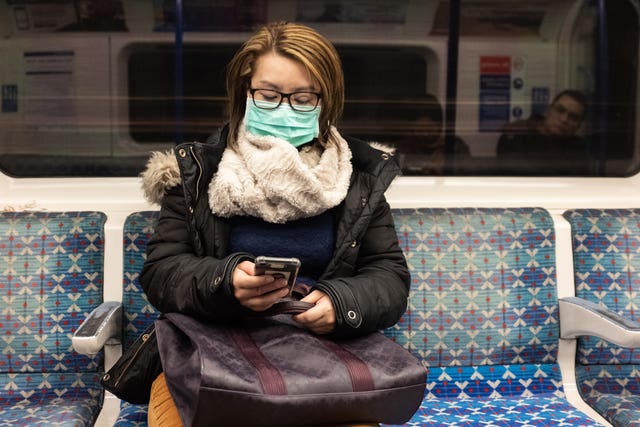
Coronaviruses are a large family of viruses that cause illnesses ranging from the common cold to more severe diseases such as Severe Acute Respiratory Syndrome (Sars).
The strain that has recently emerged is a new strain that has not been previously identified in humans. The respiratory disease it causes has been named Covid-19 by WHO.
– Where did it come from?
Coronaviruses are zoonotic, meaning they are transmitted between animals and people, the World Health Organisation says.
The first cases identified were among people connected to the Huanan Seafood Wholesale Market in Wuhan in China.
– How is it spread?
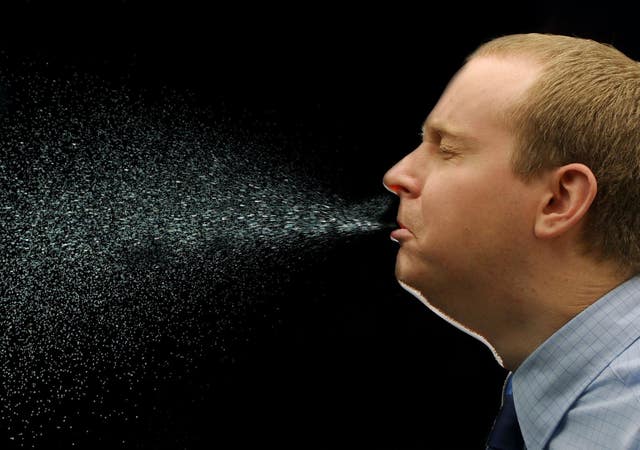
The disease can spread from person to person through small droplets from the nose or mouth which are spread when a person with the virus coughs or exhales.
These droplets land on objects and surfaces around the person and can be picked up other people touching them then touching their nose or mouth, it added.
– How can you stop it?
Thorough hand-washing, maintaining distance from others, and avoiding hand-shakes are among the most effective measures for reducing your risk of catching coronavirus.
Everyday precautions like carrying hand sanitiser, covering your mouth and nose with a tissue or sleeve when you cough or sneeze, rather than your hands, and binning used tissues immediately is also helpful, according to the NHS.
– What are the symptoms?
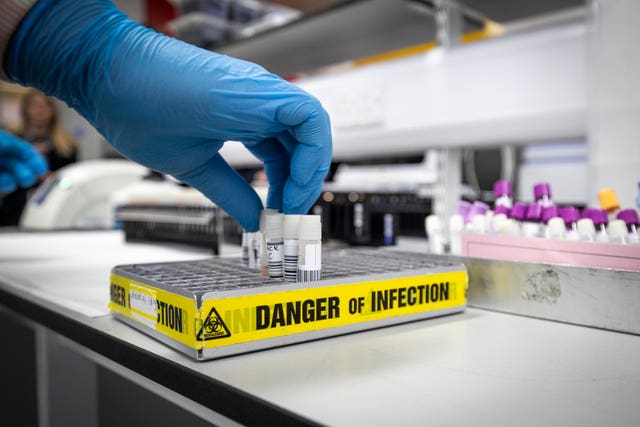
Initial symptoms of the novel coronavirus include fever, cough, tightness of the chest, shortness of breath and breathing difficulties.
More severe cases can cause pneumonia, severe acute respiratory syndrome, sepsis and septic shock, which can lead to death.
There are no specific treatments or vaccines for a new coronavirus but symptoms can be treated.
– Can people with no symptoms spread the virus?
The jury is still out on this one, although scientists believe there is evidence of asymptomatic transmission.
The Department of Health has said it believes the risk of catching coronavirus from someone with no symptoms at all is low.
But because many people with Covid-19 experience only mild symptoms, particularly during the early stages of the disease, it is possible to catch it from someone who has mild symptoms.
– Are some groups more at risk?
The UK Government says based on current evidence most cases appear to be mild and those who have died in Wuhan appear to have had pre-existing health conditions.
The World Health Organisation has said about four in five people who contract the virus get mild symptoms and recover.
But it added older people or patients with pre-existing medical conditions such as high blood pressure, heart disease or diabetes are more at risk of developing serious illness.


Comments: Our rules
We want our comments to be a lively and valuable part of our community - a place where readers can debate and engage with the most important local issues. The ability to comment on our stories is a privilege, not a right, however, and that privilege may be withdrawn if it is abused or misused.
Please report any comments that break our rules.
Read the rules here